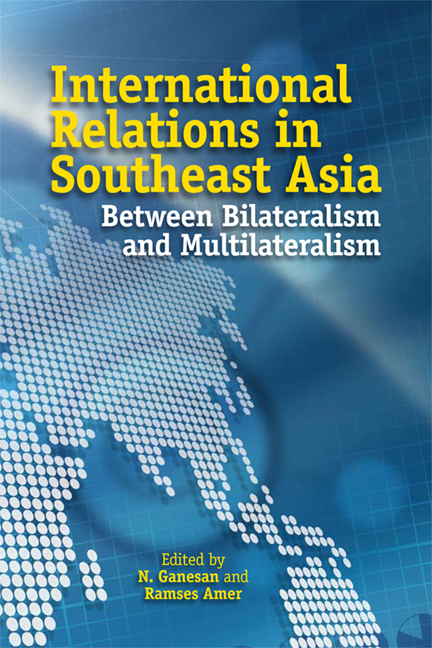Book contents
- Frontmatter
- Contents
- Preface
- List of Abbreviations
- Contributors
- Introduction
- Part I On International Relations
- Part II Case Studies — Mainland Southeast Asia
- Part III Case Studies — Maritime Southeast Asia
- 7 Malaysia-Indonesia Bilateral Relations: Sibling Rivals in a Fraught Family
- 8 Indonesia-Singapore Relations
- 9 Bilateralism and Multilateralism in Malaysia-Philippines Relations
- 10 Malaysia-Singapore Relations: A Bilateral Relationship Defying ASEAN-style Multilateralist Approaches to Conflict Resolution
- 11 Bilateral Relations between Indonesia and the Philippines: Stable and Fully Cooperative
- Conclusion
- Index
9 - Bilateralism and Multilateralism in Malaysia-Philippines Relations
from Part III - Case Studies — Maritime Southeast Asia
Published online by Cambridge University Press: 18 November 2017
- Frontmatter
- Contents
- Preface
- List of Abbreviations
- Contributors
- Introduction
- Part I On International Relations
- Part II Case Studies — Mainland Southeast Asia
- Part III Case Studies — Maritime Southeast Asia
- 7 Malaysia-Indonesia Bilateral Relations: Sibling Rivals in a Fraught Family
- 8 Indonesia-Singapore Relations
- 9 Bilateralism and Multilateralism in Malaysia-Philippines Relations
- 10 Malaysia-Singapore Relations: A Bilateral Relationship Defying ASEAN-style Multilateralist Approaches to Conflict Resolution
- 11 Bilateral Relations between Indonesia and the Philippines: Stable and Fully Cooperative
- Conclusion
- Index
Summary
The Philippines and Malaysia have had an “abnormal” bilateral relationship over the past four decades. The two countries have had to close down their embassies several times since full diplomatic relations were established in May 1964. The main reason for this development is the territorial dispute over Sabah. As the current Philippine Ambassador to Malaysia Victoriano Lecaros said, “there is nothing in our relations with other countries that comes to the nature of Sabah.” The dispute over this large, 76,115 square kilometre property has been the thorn in the history of Philippines-Malaysia bilateral relations. The Sabah claim initiated or complicated two major contentious issues in the bilateral relationship which have persisted to this day: the Muslim separatist rebellion in the southern Philippines and Filipino labour migration to Sabah. The other contentious bilateral issue tackled in this chapter is the conflicting claims of the two countries over territories in the South China Sea.
Through the years, the two countries have been using bilateralism to manage the contentious issues in their relationship. In the case of Malaysia, bilateralism is the primordial way of dealing with the Philippines. Being the economically-stronger nation, bilateralism has enabled Malaysia to strengthen its position on the various contentious issues vis-à-vis the Philippines.
The Philippines, on the other hand, has been using bilateralism and multilateralism in managing contentious issues with Malaysia. The Philippines has sought to raise the dispute over Sabah in the United Nations International Court of Justice (ICJ) but has not got Malaysia's consent.
With regard to its problem with Muslim separatists in the south, the Philippines allowed the Organisation of the Islamic Conference (OIC) to play a key role in resolving the conflict with one faction of the Muslim separatists, the Moro National Liberation Front (MNLF). It has also invited Malaysia to broker the peace negotiations with the other separatist group, the Moro Islamic Liberation Front (MILF). Other nations are now also involved in the peace process.
- Type
- Chapter
- Information
- International Relations in Southeast AsiaBetween Bilateralism and Multilateralism, pp. 225 - 253Publisher: ISEAS–Yusof Ishak InstitutePrint publication year: 2010

